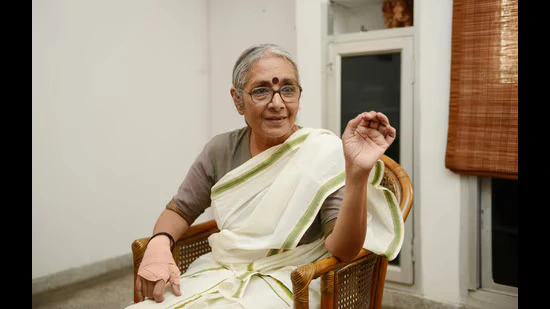A woman who gave up her comfortable IAS job and relocated to a village to work for the betterment of the marginalised, Aruna Roy became a torchbearer of the Right to Information movement. On World Humanitarian Day, she speaks exclusively to The CSR Journal about her journey, insights, and message for those who believe change is not possible.
Roy, a Ramon Magsaysay Awardee, social activist, and the driving force behind India’s Right to Information movement, is known for her lifelong commitment to empowering people through transparency and accountability.
RTI has become a major tool for empowerment today. How did the idea shape in your journey?
The Right to Information was born out of the spirit of inquiry. Active questioning is vital, and what RTI did was to legitimise that questioning. But it didn’t begin with a theory. It began with poor workers in Rajasthan’s Rajsamand district, who wanted to see their bills and vouchers because they were being denied their minimum wages.
From there, it grew into a universal tool. You can ask about wages, records, judicial issues, legislative matters, the functioning of government, or even exams. RTI turned the dissemination of information into the dissemination of power.
There is no democracy without transparency. RTI became a practical way to express people’s sovereignty — not just in Parliament, but with the ration dealer, the midwife, or the medicine supplier. It became a universal right and took the country by storm.
Was there a defining moment when you realised the power of transparency in governance?
There wasn’t a single defining moment. It was an organic process. My seven years in the IAS made me realise that secrecy was maintained at all levels. Information was withheld even when it was useful for people.
Later, while working with the poor, I saw that transparency directly threatened corruption, misuse of power, and unethical practices. It could lead to accountability, punishment, and recovery of money. That’s why transparency is vital for good governance.
Globally, transparency and accountability are not new ideas. But in India, it was the poor who emphasised and shaped them into a movement. Today, despite attempts to weaken it, between 40 to 60 lakh people use RTI every year. Just recently, in Madurai, 2000 RTI users gathered to reaffirm its role in ensuring accountability.
As one of the slogans says: “My money, my accounts” — because government money is people’s money, and citizens have the right to monitor how it is used.
In today’s scenario, do you think the power of RTI has been diluted?
Yes, unfortunately. A new law called DPAPA has been introduced to curtail RTI. It makes an RTI application liable for prosecution if it asks for third-party information. This weakens the tool and discourages its use.
What message would you give to people who believe change is not possible?
If someone says change is not possible, it often means they don’t want to work for it. Change doesn’t come instantly like coffee or instant gratification. It is a process that demands hard work, consistency, the ability to face failures, and the courage to keep going.
I would tell anyone who doubts — just step out of your house and see what you can do. Even a small action adds up to a massive change when multiplied across society.


